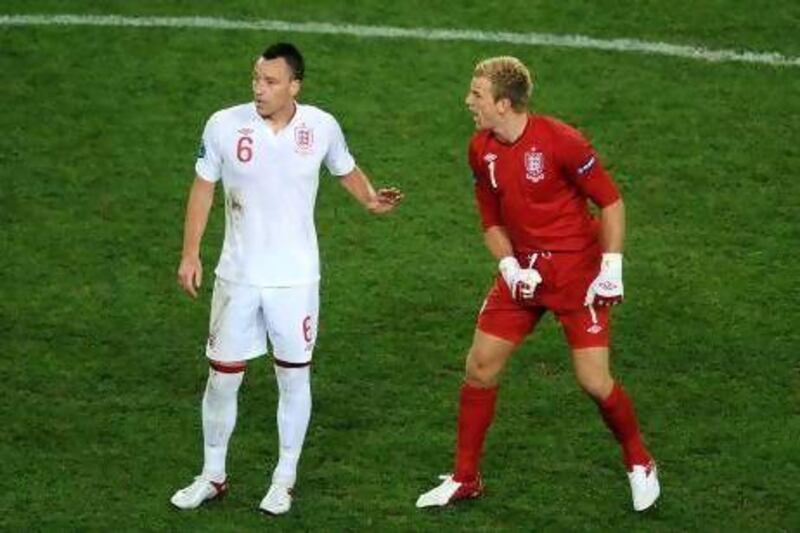A theme of the build-up to tonight's European Championship quarter-final in Kiev has been shifting identities.
A resurgent, dogged England are said to defend like Italians. They take that as a compliment, one that conceals the chaotic episodes they have ridden out during the campaign. A fluent, tactically flexible Italy earn praise for their proactive football. The New Azzurri, Italy concede, aspire to play a possession, not just a counterattacking, sort of game.
England are flattered to be told they seem as hard to penetrate as an old-fashioned Italian defence because many of their players were brought up on the idea that, in Italy, a solid rearguard is the foundation of success.
In many cases, England's players have spent significant spells of their careers being directly instructed by Italians. Although England and Italy seem to meet rarely in major tournaments, the relationship between the two football cultures has become a close one in the past two decades.
Television played a formative part. In the early 1990s, when the live broadcasting of domestic English football jumped suddenly from free-to-air English screens to pay-TV, many working-class Britons changed their Sunday afternoon viewing habits.
Channel 4, a terrestrial station, bought the rights to show Serie A games. Italy's top flight was then the most glamorous division in the world.
Deprived of seeing the new Premier League on television, many English fans became "Italianised". They became intrigued by the AC Milan of Ruud Gullitt and Franco Baresi and the emergence of a young Alessandro Del Piero at Juventus; more intrigued, in some cases, than they had been by, say, George Graham's dour Arsenal, the English giants of the era.
Gradually, though, the Premier League grew in power, quality and appeal and its rising levels of subscription and advertising made it rich, and as extravagant a recruiter of exotic and brilliant talents as Serie A had once been.
But a certain awe of Italian football stayed in English minds, not least because the Azzurri, the Italy national team, could be seen to suffer some of the same symptoms of suffocating expectation and tension at tournaments that modern England became prey to. The difference? Italy could still win a fourth World Cup, as they did in 2006.
Somewhere in English football's idea of itself there still lingers the notion that in matters of strategic theory, Italy knows better than the English do.
Two of the past four managers appointed to take charge of England's national team were men with long records of work in the Italian club game: Sven-Goran Eriksson and Fabio Capello. The most recent, Roy Hodgson, is partly admired because he has achieved a rare feather in his cap for an English manager who is under 70 years old: he has worked in Serie A, as he did with Inter Milan and, briefly, Udinese.
Hodgson knows how to keep a back four tight, and how to get a midfield to work in concert with a marshalled defence not simply because he had a couple of seasons in Italy, but the experience certainly made him worldlier.
Similarly, a young John Terry learnt hungrily when he played alongside Marcel Desailly, once a giant of Serie A, at Chelsea. Terry, a commanding and cunning central defender, has had no fewer than four Italian managers in his Chelsea career; Glen Johnson worked at Chelsea with one of them, Claudio Ranieri; Ashley Cole worked with two, Carlo Ancelotti and Roberto Di Matteo. As Gianluca Vialli, Chelsea's Italian manager at the end of the 1990s and a former Serie A star, remarked last week: "Chelsea have just won the Champions League defending in a very Italian way."
Joe Hart and Joleon Lescott, the remaining members of England's back five, have just won the Premier League with Manchester City defending in a very effective way. The fact their manager for that triumph was Vialli's friend Roberto Mancini, allows us to suppose some strong Italian values have rubbed off on them, too.
Ahead of tonight's quarter-final, Hart, England's impressive goalkeeper, spoke about the influence on his career of the Italy keeper Gii Buffon. The two men, nine years apart in age, scarcely know each other but Hart has studied Buffon's technique, and admired "his style, and his mannerisms".
He would have liked to admire and study them more, Hart added, but with Italian football no longer so widely available on English television, as it was when Hart was a boy watching Serie A, free, every Sunday, he regretted that "you don't have as much access as you used to".
But nor do England regard the Italian game with quite the awe they did when Hart was spending his schoolboy Sundays watching Parma or Juventus.
Follow us
[ @SprtNationalUAE ]






